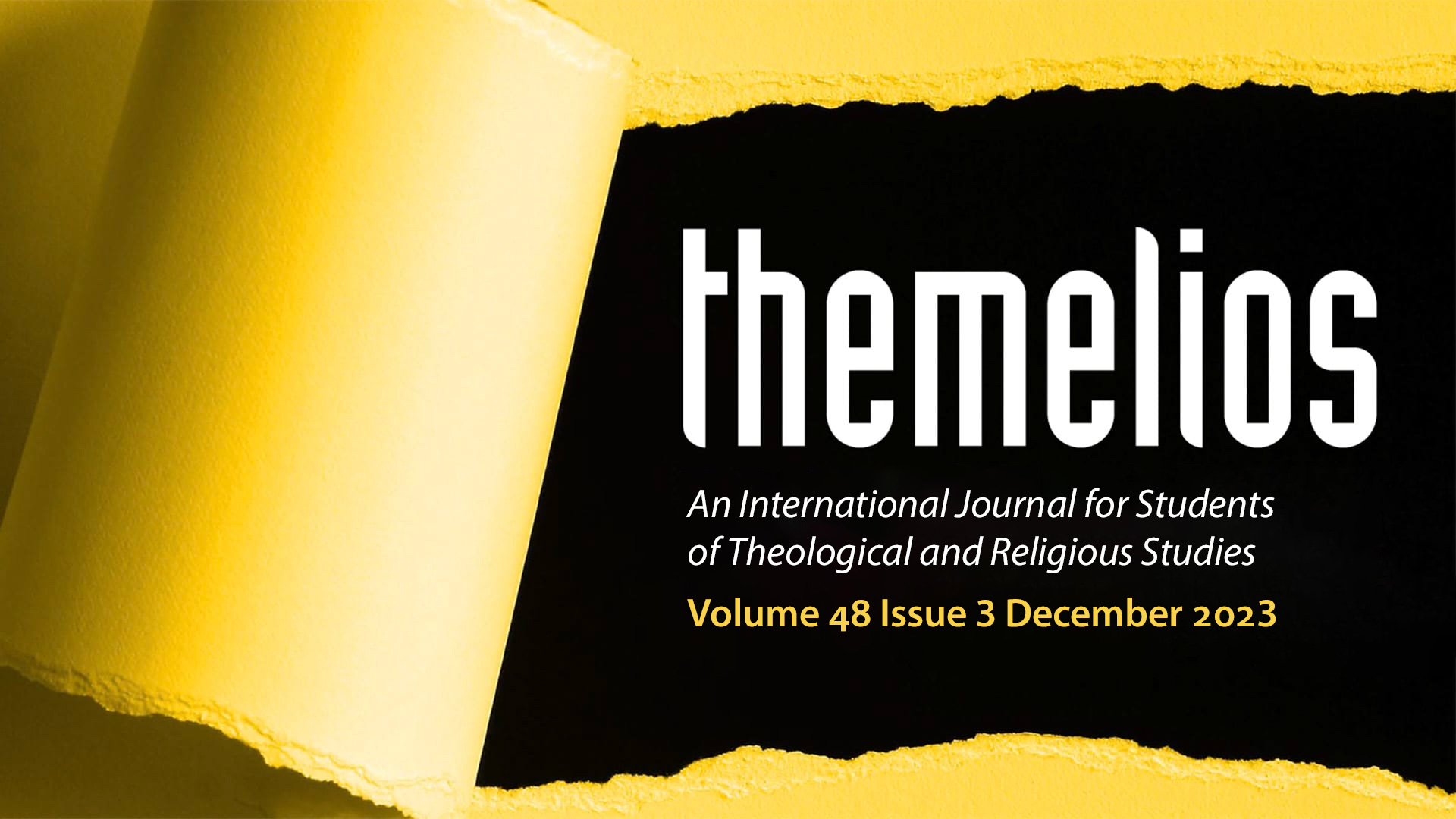
www.thegospelcoalition.org
Why Ligon Duncan Is Still Building Institutions
If anyone ever asks you which living theologian you’d most like to have lunch with‚ you may want to consider choosing Reformed Theological Seminary (RTS) chancellor and CEO Ligon Duncan.
Here’s why: Ligon is warm‚ engaging‚ and quick to laugh. He remembers your name‚ tells funny stories‚ and can talk about nearly any topic‚ from the covenant idea in ante-Nicene theology to NASCAR. He’s friendly and easy to be friends with.
“Lig is one of the kindest‚ most gracious‚ most encouraging men I know‚” Kevin DeYoung said. “And that’s saying a lot considering he is also whip-smart and in charge of such a large‚ sprawling institution.”
You can tell Ligon likes people by looking at his bio page: He’s been involved in more than 35 book projects‚ but nearly every one was a collaborative effort. He’s been the moderator for the Presbyterian Church in America (PCA) General Assembly and for regional presbyteries but has spent far more hours on nearly a dozen denominational committees‚ considering issues from strategic planning to missions to psalmody. And his friendship with Mark Dever and others was strong enough to build a conference on.
Mark Dever and Ligon Duncan at T4G / Courtesy of Ligon Duncan
“I like working in a team setting‚” said Ligon‚ who celebrates a decade of leading RTS this year. “I love the nonloneliness of a local church and of the seminary‚ where there are colleagues collaborating and working together. I just love that environment.”
That’s not the only thing he loves about institutions. He loves the accountability‚ the slower process of growth‚ and the sanctification that happens when students or elders or ministry partners work and argue and agree together.
“I’ve always enjoyed investing in things that were good and godly and helpful—things that other people laid the foundations for and I could be part of‚” he said.
That’s not to say institutions are perfect. Ligon works every day to keep the eight RTS campuses on the same page. He helped lead the corporate repentance for his church tradition’s history of embracing chattel slavery and Jim Crow laws. And he watched his father‚ an eighth-generation southern Presbyterian ruling elder‚ agonize over leaving his denomination when they no longer upheld the inerrancy of Scripture.
But even though it’s been frustrating and painful‚ even though “40 percent of the people out there are always going to disagree with you‚” there’s a reason you won’t find Ligon Duncan Ministries anywhere.
“Lig is one of the guys whose influence for good often goes unnoticed because he loves to platform others and never toots his own horn‚” DeYoung said.
In an age of individual platform building‚ Ligon is still all in on building institutions other people started.
Tradition‚ Gospel‚ and Gospel Tradition
For Americans‚ the Duncans are unusually anchored in history. Ligon can trace his family tree back to the 1700s‚ when his ancestors immigrated from Scotland to the New World. They took their denomination with them‚ and unbroken generations of Duncan men have served as elders in southern Presbyterian churches ever since.
Even Ligon’s name is a heritage—he’s the third Jennings Ligon in a row. “Growing up‚ family and friends called my dad ‘Big Lig‚’ and Ligon ‘Little Lig‚’” explained Ligon’s youngest brother‚ Mel.
Big Lig was a World War II vet who met Shirley Ledford—a Southern Baptist musician—on a blind date. Even though Calvinism wasn’t widespread in the SBC‚ she was more Reformed than he was—her childhood pastor quoted Spurgeon nearly every week‚ while Big Lig’s Presbyterian denomination was sliding away from orthodoxy.
Ligon with his parents / Courtesy of Ligon Duncan
Shirley had a master’s degree in church music from Southern Theological Seminary and had been serving in Southern Baptist women’s ministries for nearly 10 years by the time she met Big Lig. But he had seven generations of Presbyterianism behind him‚ so they ended up at Second Presbyterian Church in Greenville‚ South Carolina.
“Part of what enabled her to leave her Baptist roots was that she so respected Gordon Reed’s preaching‚” Ligon said. Reed‚ who held to the inerrancy of Scripture‚ was revitalizing the church through expository sermons and catechism teaching. He sealed Shirley’s approval by introducing her to the work of Martyn Lloyd-Jones.
Shirley threw her support wholly behind Reed. She directed church music‚ taught women’s Bible studies‚ and led Sunday school. Her three sons grew up chasing each other around the churchyard‚ singing in the choir‚ and listening to theological conversations over Sunday dinners.
Ligon’s father‚ Jennings Ligon Duncan Jr. / Courtesy of Ligon Duncan
Those weren’t easy discussions—even before Ligon started kindergarten‚ his pastor and his parents were worried about the slipping orthodoxy of the Presbyterian Church in the United States (PCUS).
“The day before Christmas 1962‚ the Presbyterian Outlook published a cover article that said‚ ‘Do we need an infallible Bible?’” Ligon said. “And they had articles by four professors from the major southern Presbyterian seminaries‚ all of whom answered that question: No.”
Right away‚ conservatives began working on plans for a new seminary that would teach biblical inerrancy. Two years later‚ RTS was off and running. Seven years after that‚ Gordon Reed was one of the 30 teaching elders who founded the Presbyterian Church in America (PCA).
“It was a gut-wrenching time for my father—his whole family was in the PCUS‚” Ligon said. “I can remember my dad sitting in his wingback chair‚ just agonizing over the decisions he was going to have to make.”
In the end‚ his father picked the gospel over his denomination.
“It was a matter of conviction for him‚” Ligon said. “That was a very good thing for me to see.”
From the South to Scotland
Ligon grew up steeped in the traditions of the American South in the 1960s and ’70s. Even after Jim Crow laws were overturned and schools integrated‚ remnants of racism remained. Some white people were still openly hostile; some doctors still segregated waiting rooms; and some churches‚ such as First Presbyterian Church in Jackson‚ Mississippi‚ didn’t allow black people into the sanctuary.
Some of those same people—such as Ligon’s dad’s cousin‚ who was the minister at First Presbyterian in Macon‚ Georgia—were bright‚ effective preachers; serious proponents of missions; and founding elders in the PCA. It was sometimes hard to distinguish which of their views were cultural and which were biblical.
John‚ Ligon‚ and Mel Duncan with their mother‚ Shirley / Courtesy of Ligon Duncan
For a long time‚ Ligon didn’t even think to ask. He had other things to think about—at school‚ he was outgoing and popular‚ played offensive line for the football team‚ and worked as the DJ for the school radio station (radio name: “Live Lig”).
He’d made a profession of faith at 10 years old but struggled to know if he was really saved until he heard a pastor at a youth conference preach on Ephesians. Suddenly‚ he caught what he’d been taught all his life.
“I understood then that before I had ever trusted in God‚ he had already reached out in grace to me‚” Ligon said. “Before the foundation of the world‚ God loved me‚ and he chose me. And that’s why I had trusted in him. That was huge. That was formative for me.”
Ligon kept growing. He taught Sunday school with his dad‚ sang in the choir for his mom‚ and went on family vacations to the PCA’s annual General Assemblies. He read all kinds of books‚ laughed with his friends‚ navigated relationships with girls‚ and coached his little brother’s basketball team. Later‚ he graduated from Furman University with a BA in history‚ then from Covenant Seminary with an MDiv and‚ a year later‚ an MA in historical theology.
It wasn’t until he landed in Scotland to work on his PhD at the University of Edinburgh that his cultural expectations became uncomfortable.
Al Mohler‚ Mark Dever‚ and Ligon Duncan at Wartburg castle in Eisenach‚ Germany / Courtesy of Ligon Duncan
“The things I was assuming were just normal for everyone were not‚” Ligon said. “I was around theologically conservative Christians‚ but they had very different cultural values and views than I had grown up with. . . . That helped me to reflect critically on my own upbringing and culture and have a wider view of the world.”
He wasn’t exposed just to Scottish Christians but also to students from Africa and Russia and Britain. And he met another Southern boy—a Baptist named Mark Dever—who was studying at Cambridge and loved church history as much as he did. They hit it off immediately—both wanted to do things like trace the path of The Canterbury Tales—and Mark started introducing Ligon to everyone he knew.
“The world got bigger for me‚” Ligon said. “That was an important part of my education.”
Starting Out
Years ago‚ someone gave Ligon a personality test to figure out what work motivated him the most. The answers: teaching and travel.
Sure enough‚ months after he was ordained—and before he’d even finished his PhD—Ligon took a job teaching at RTS in Jackson. Back then‚ RTS was smaller—just over 600 students on two campuses.
“I’d wake up at 4:00 in the morning and try to get lectures ready for class—I taught 14 different courses in my first three years‚” Ligon said. “I had a lot of preps. I can remember ripping the paper with my lecture off the dot matrix printer and walking into a classroom with the paper still warm.”
Ligon with his father / Courtesy of Ligon Duncan
He’d teach all day at his full-time job‚ then go to work at his part-time job as assistant pastor at an area church. Around 8:00 or 9:00 p.m.‚ he’d get home‚ pop in a TV dinner‚ watch CNN for half an hour‚ and head to bed.
When a friend asked how his social life was‚ Ligon told him‚ “I don’t have one.”
His friend came right to the point. “Well‚ do you want to be married?”
Ligon did‚ and he started circling around a graduate student in the marriage and family therapy program. Her name was Anne Harley‚ and even though she wasn’t in any of his classes‚ he had to ask the dean’s permission to date her.
“It took me a long time to get up the courage to ask her out‚” Ligon said. “I realized I needed to be serious about dating or I couldn’t do it. I couldn’t put a student‚ or myself‚ or the seminary in that situation.”
Their first date was toward the end of the spring semester—and before the end of winter break‚ they were married.
She was just as hard-working and serious about education as he was. The following Monday‚ they were both back in the classroom.
Teaching and Preaching
In 1996‚ Ligon received a call to be the senior pastor at the historic First Presbyterian Church in Jackson. It was a great opportunity at a huge church—around 60 elders served a congregation of 3‚000. But when RTS board member Richard Ridgway heard about it‚ he was upset.
“I picked up the phone and called [then RTS board chair] Bob [Cannada]‚” Ridgway said. “I said‚ ‘They’re taking one of our best future scholars and theologians and making him a pastor!’”
“Don’t worry about it‚” said Cannada‚ who was also an elder at First Presbyterian. “We all belong to the Lord‚ and he moves us around like pawns on a chessboard wherever he wants us.”
It seemed as if God had Ligon on multiple squares at once‚ moving between institutions and groups of people. During his 17 years of leading First Presbyterian‚ Ligon continued to teach classes at RTS. He served as president of both the Alliance of Confessing Evangelicals and the Council on Biblical Manhood and Womanhood. He worked on PCA committees‚ was elected moderator of the General Assembly‚ and joined dozens of book projects. He formed T4G with his friends‚ helped to start The Gospel Coalition‚ and traveled to speak on both sides of the Atlantic.
In every one of those endeavors‚ he was building something with somebody else.
Chancellor and CEO
One of Ligon’s favorite things about institutions is the accountability they provide.
“I remember watching a guy several years ago on a podcast talk about how he established accountability in his organization‚” Ligon said. “And the little bubble above my head was‚ ‘Bubba‚ if you’re the one establishing accountability in your organization‚ there is no accountability in your organization.’ And that’s one reason I love institutions.”
That attitude is also one reason why institutions love Ligon. When RTS began looking for its next chancellor and CEO in 2013‚ the board wanted a man who could submit himself to authority. For many pastors‚ especially those without a strong elder board‚ this can be a challenge.
RTS chancellors Ric Cannada (2002–12)‚ Ligon Duncan (present)‚ and Luder Whitlock (1978–2001) / Courtesy of Ligon Duncan
For Ligon‚ this was no problem.
“He understands authority‚” Mel said. “He is not threatened by it. He exercises a lot of it in his life‚ so he’s not afraid to have to submit to it.”
His first act of submission was to apply.
“When I asked Ligon if he’d consider it‚ he said‚ ‘I was hoping and praying you would not ask me this‚’” Ridgway remembers. “He wanted to retire as pastor of First Pres.”
But his friend Al Mohler‚ who had become the president of Southern Baptist Theological Seminary in 1993‚ told him he had to do it. RTS’s position in evangelicalism—as a smaller Reformed seminary with an outsize influence—meant it had to stay gospel-centered‚ Mohler told him.
So 10 years ago‚ Ligon took on the most challenging‚ complicated role of his life.
“We’ve got 175 full-time employees spread across eight campuses‚ plus global stuff‚ plus the doctoral program in Brazil and the Center for Reformed Theology in Indonesia‚” he said. “It’s a challenge to keep everybody rowing in the same direction. And then you have to go out and raise money and recruit students. And then you have to be involved in the life and ministry of the church.”
But because he’s part of an institution‚ he doesn’t have to do those things alone. On the RTS board of about 20‚ members commit to six-year terms but are expected to serve for life. That ensures they’re always considering long-term solutions—many will be there after Ligon is gone. In addition‚ a smaller committee regularly goes over his schedule‚ helping him decide on commitments and direct his time. Each day‚ his assistants help prioritize his tasks.
But while biblical accountability helps‚ Ligon knows it’s not a guarantee against cultural pressures or institutional sin.
Racism and Repentance
In 2015‚ Ligon and his friend Sean Lucas introduced a personal resolution at the PCA’s General Assembly.
The PCA wasn’t around during the civil rights movement‚ they said. But many of its churches were. And some of them “actively worked against racial reconciliation in both church and society‚” Ligon and Sean wrote. They called for confession and repentance.
Within the next year‚ both the PCA and First Presbyterian Jackson did so.
Ligon at T4G in 2018 / Courtesy of T4G
Later‚ before 12‚000 T4G attendees‚ Ligon addressed the issue again: “Leading up to 1837‚ both Baptists and Presbyterians decided that slavery and slave-holding [were] dividing the church.”
In the interests of “unity‚” they found a loophole in the commandment to love your neighbor‚ Ligon said. “So if you get all antsy when somebody starts applying the second [great] commandment here‚ it’s because they taught you well. They taught me well. It has taken more than three decades for God to bring this blindness off of my heart.”
Many affirmed Ligon’s stand—but not everyone.
“I knew there would be some blowback‚ but I didn’t expect it to be what it was‚” Ligon said. Social media posts and blogs wondered aloud if the stalwart conservative had veered liberal‚ and some of his conference speaking invitations disappeared. Still‚ he doesn’t regret it.
“Christians cannot afford to overlook any area of our hypocrisy‚ either personally or institutionally‚” he said. “Because when people see our hypocrisy‚ and we try and pretend like it’s not there‚ that undermines the truth claims that we so deeply care about in the Bible.”
Just like his dad‚ Ligon chose the gospel over his heritage.
Upside Down
If you need more proof that Jesus’s kingdom is counterintuitive‚ here’s some: When you choose your institution over the gospel‚ you get neither. But when you choose the gospel over your institution‚ you may get both.
Over the past 50 years‚ the PCA has grown from 260 churches with about 40‚000 members to more than 1‚600 churches with close to 400‚000 members. The denomination has more teaching elders‚ more adult baptisms‚ and more giving than it did even five years ago.
Ligon talking with RTS students / Courtesy of RTS
RTS is thriving too. Over the past 10 years‚ enrollment is up 12 percent‚ to nearly 1‚150 students. MDiv enrollment jumped 34 percent to 530 students. The school also added more campuses—in New York City and Texas—and sold more credit hours of education last year than ever before.
That’s because of the grace of God‚ who is using Ligon‚ Ridgway said. “He has the reputation‚ the ability to speak‚ the theological chops‚ the ability to build camaraderie and unity within the organization—Lig is the whole package.”
He’s aware of what’s going on. Ligon can see the culture losing trust in nearly all institutions‚ including in-person education‚ churches‚ and denominations. Still‚ that’s where he’s investing his time‚ money‚ and considerable energy—and not just because he likes people and accountability.
“Institutions actually are the engines that allow movements to continue on into the next generation in a healthy‚ flourishing way‚” he said.
But that’s not because institutions themselves are flawless.
Eventually‚ Ligon will retire from RTS. When he does‚ how will he ensure the seminary continues in a healthy way? What’s the most important trait RTS will need in a future leader?
Ligon thought a minute before he answered‚ “Theological centeredness.”

















